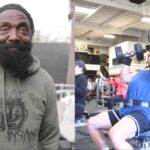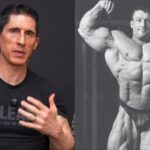Dr. Andrew Huberman credits a happy and healthy life to the same fitness routine he’s used for 30 years. In a recent appearance on Lex Fridman’s Podcast, Huberman revealed that he lifts weights at varying intensities three days out of the week, and also runs at different speeds three times a week.
As a Stanford neuroscientist, it didn’t take long for Andrew Huberman to attract attention online. His easy-to-understand videos and content about science have turned him into a beacon of knowledge for the fitness community.
Having made appearances on major platforms like The Joe Rogan Experience, Huberman isn’t afraid to challenge conventional wisdom or explore controversial issues, such as finding ways to bio-hack the body.
One of the last times he sat down with Rogan, he was asked about the viral sensation Liver King (real name: Brian Johnson). At the time, he suspected Liver King was using testosterone replacement therapy before the world found out about the 45-year-old’s leaked steroid cycle.
In addition to diet and exercise, Huberman talks openly about the supplement market. In a previous conversation with Rogan, the doctor touted the muscle-building qualities of Turkesterone. However, this time, he’s opening up about his go-to health and wellness routine.
Andrew Huberman Shares His Workout Routine: ‘Subjecting the Body to Different Stressors is Valuable’
Huberman shared that running three times a week and lifting weights three times a week are essential aspects of his fitness routine. He regularly modifies the intensity of each workout, which he believes has a positive effect on his cognition.
“I’m not trying to lose weight but I always do the same fitness routine, I have for like 30 years basically. Lift three days a week, run three days a week, but one of the runs is a long run, one of them is medium, one of them is a sprint-type thing. What I’ve decided to do this year is just extend the duration of the long run.
I like being mobile. I never want to be so heavy that I can’t move. I want to be able to go out and run ten miles if I have to so sometimes I do. And I want to be able to sprint when I have to, so sometimes, I do. Lifting objects feels good. It feels good to train like a lazy bear and lift heavy objects but I’ve also started training with lighter weight and higher repetitions for three-month cycles and it gives your joints a rest,” said Huberman.
“I think it’s also interesting to see how training differently changes your cognition. That’s probably hormone related. You know, hormones are downstream of training heavy versus hormones downstream of training a little lighter. I think my cognition is better when I’m doing more cardio and when the repetition ranges are a little higher, which is not to say people that lift heavy are dumb because there’s real value in lifting heavy.”
Should You Lift Light or Heavy Weight? Huberman Says Both.
If health and wellness are the goals, Huberman swears by subjecting the body to several different stressors.
“Lifting heavy and then taking 3-5 minutes rest is far and away a different challenge than running hard for 90 minutes. That’s a tough thing. Just like getting in an ice bath, people say how is that any different than working out. Well, there’s a lot of differences. One of them is it’s very acute stress, within one second you’re stressed. I think subjecting the body to a bunch of different types of stressors in space and time is really valuable. So yeah, I’ve been playing with the variables in a pretty systematic way.”
Lastly, Huberman advocated for integrating exercise with cognitive work like reading a book.
“The practice I’ve been doing a lot more of lately. I walk while reading a book, in the yard I’ll just pace back and forth or walk in a circle. A hard copy. I hold the book and I’m walking and reading. I usually have a pen and I’m underlining. I have this whole system, underlining, stars, exclamation points.”
“On the long runs, the walks, integrating that with cognitive work. Harder to do with sprints and the gym,” added Huberman.
Huberman isn’t the only popular name in fitness assessing the differences between lifting light versus heavy. Recently, former four-time Mr. Olympia Jay Cutler and Mike O’Hearn discussed the topic. They urged lifters to exercise with a ‘surgical’ mindset, paying attention to each contraction to capitalize on time under tension.
With over 3.5 million subscribers on YouTube, Andrew Huberman is a leading voice for those aiming to adopt healthier habits. Most importantly, he values switching up exercises, intensity, and duration to reap the most benefits possible from physical fitness.
RELATED: HIIT for Beginners: How High Intensity Exercise Can Dramatically Improve Your Workout
Watch Lex Fridman’s full podcast below:
Tip: If you're signed in to Google, tap Follow.









